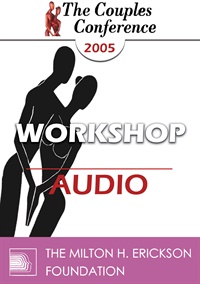CC05 Workshop 02 - The Fundamentals of Relational Recovery Therapy - Terry Real, LICSW
- Average Rating:
- Not yet rated
- Topic Areas:
- Workshops | Relational Recovery Therapy (RRT) | Relationships
- Categories:
- Couples Conference | Couples Conference 2005 | Pioneers in Couples and Family Therapy
- Faculty:
- Terry Real, LICSW
- Duration:
- 1:52:59
- Format:
- Audio Only
- Original Program Date:
- Mar 04, 2005
- License:
- Never Expires.
Description
Description: Presents the core principles of Relational Empowerment Therapy, addressing cultural shifts from traditional to intimate partnerships. Focuses on correcting emotional imbalance between men and women by confronting grandiosity and empowering the less dominant partner. Highlights the use of leverage, healthy shame, directive techniques, and family-of-origin work to foster authentic connection. Emphasizes the role of therapists in teaching skills and guiding clients toward mutual respect and intimacy.
Syllabus Description: This workshop introduces participants to the fundamentals of Relational Recovery Therapy, a new approach to couples therapy. The workshop follows the phases for treatment: empowering the woman; connecting the man; relational "diagnosis"; prerequisites for intimacy; describing a new vision of love; learning relational skills; amplifying progress; building a relational sub-culture. This workshop will look closely at the art of therapeutic truth telling.
Educational Objectives:
- To describe how to proactively "install" new skills in couples therapy.
- To name three ways to shift abusive behaviors.
*Sessions may be edited for content and to preserve confidentiality*
Credits
Handouts
| Timestamped Transcript (705.1 KB) | 14 Pages | Available after Purchase |
| Timestamped Transcript (796 KB) | 17 Pages | Available after Purchase |
| Ericksonian Learning Snapshot (248.5 KB) | 2 Pages | Available after Purchase |
Faculty

Terry Real, LICSW Related Seminars and Products
Terry Real, LICSW, is a nationally recognized family therapist, author, and teacher. He is particularly known for his groundbreaking work on men and male psychology as well as his work on gender and couples; he has been in private practice for over twenty-five years. Terry has appeared often as the relationship expert for Good Morning America and ABC News. His work has been featured in numerous academic articles as well as media venues such as Oprah, 20/20, The Today Show, CNN, The New York Times, The Wall Street Journal, Psychology Today and many others.


